Introduction
The internet and mobile phone technology have changed our way of life. With growing access to the internet, many of us rely more than ever on digital media to search for information (e.g., online news), watch videos, listen to music, play games, or engage in social activities (e.g., email, social media). Indeed, for many, online social networking or being active on social media has become an essential part of connecting socially. As of 2022, there are approximately 4.48 billion active users of social media, accounting for about 56.8% of the global population (Dean, 2022). According to a 2021 Pew Research survey (Perrin & Atske, 2021), 36% of adults 18 to 29 in the US say they ‘often get news via social media’, which is higher than the share saying they ‘often get news via other platforms.’ This survey also shows that 48% of adults 18 to 29 in the US state they are online almost constantly, and 46% indicate they go online multiple times per day (Perrin & Atske, 2021).
Given this reliance on the internet, it is not surprising that we seem to find it difficult to go without access to the internet. According to a recent study, only 11% of young American women and 12% of young American men believe that they can live without the internet for a full month (Dean, 2022). Now that the internet and other social media have become an indispensable part of modern life, the question emerges how we would feel if we were to voluntarily commit to forego access to the internet for 24 hours. In particular, because many people receive social support when they are online, how would they feel if they can no longer draw such social support? And, who is most likely to respond negatively to an unplugging experience because unplugging involves a loss of social support? In two studies, we investigated various well-being indicators during digital media disconnection. Furthermore, given concerns about internet usage fuelling the belief in conspiracy theories (Birchall & Knight, 2022), we also explore whether and how an individual’s belief in conspiracy theories affects their unplugging experience.
Unplugging
Not much is known about how people feel when they unplug from the internet. Studies examining the effect of unplugging among those who go hiking in the wilderness (Atchley, Strayer, & Atchley, 2012) showed beneficial effects of unplugging in terms of enhanced creativity and cognitive performance. However, beneficial effects for this group might be due to factors other than unplugging. In another 24-hour unplugging study among university students from 10 different countries, Roberts and Koliska (2014) reported that about half of the students were unable to complete the unplugging exercise for the full 24 hours and more negative than positive experiences were reported. Many reported feeling distressed and anxious while being unplugged. However, the third most reported emotion was relief from not feeling pressure to stay up to date with online information. This positive emotion was followed by reports of feeling isolated and feeling that one was missing out by not knowing what others were up to in their lives. The least frequently reported emotions were feeling calm and content.
Perhaps because unplugging was more of a personal choice than it was in the study reported by Roberts and Koliska (2014), 446 participants in the unplugging study byThomas, Azmitia, and Whittaker (2016) reported more mixed emotions. For instance, in terms of negative emotions, they reported feeling bored (39%), anxious (30%), lonely (17%) and irritated (12%) while being unplugged. However, many participants also reported feeling free (33%), relaxed (32%), relieved (24%), happy (20%), and productive (17%), as well as having more time (16%), feeling more focused (13%), and connecting better with friends and family in person (12%). Here, we focus on who is most likely to be affected (positively or negatively) by the unplugging experience and we focus in particular on the extent to which people belief in conspiracy theories. We anticipate that unplugging might be a different experience nowadays than it was when these previous unplugging studies were conducted nearly a decade ago. Given the greater reliance of people on online activities and rapid technological advancements, we were open to the finding that it is more difficult now, and potentially more distressing, for people to unplug than it was then.Before outlining our reasoning, we first outline general theorising on conspiracy theorising.
Belief in Conspiracy Theories
Conspiracy theories are simple explanations for complex issues and events, usually involving powerful individuals or groups such as the government not being transparent and open with the public about the true causes of events (Douglas, Sutton, & Cichocka, 2017; Leibovitz, Shamblaw, Rumas, & Best, 2021; Marchlewska, Cichocka, & Kossowska, 2018). Social media are an important avenue for spreading conspiracy theories because the internet allows for the rapid sharing of information. The internet allows for the dissemination of unconfirmed information and authenticity and accuracy checks are often less thorough than they are for more traditional information (Guelmami et al., 2021; Oh & Lee, 2019; Vicario et al., 2016). Importantly too, conspiracy theorists can easily get together online and the more that they form a group identity in these online ‘echo-chamber’ communities that official narratives cannot be trusted, the more their conspiracy beliefs are strengthened and affirmed (Nera, Jetten, Biddlestone, & Klein, 2022). In this way, online groups enhance ‘us’ versus ‘them’ dynamics whereby social support is given to others in the online group, and negative outgroup attitudes are cultivated by blaming others or other groups for negative results, thereby maintaining the positive image of the individual or group (Cichocka, Marchlewska, & Zavala, 2016; Jetten, Peters, & Casara, 2022).
However, the ability of conspiracy beliefs to provide certainty and answers is short-term, and in the long run, they bring many disadvantages (Leibovitz et al., 2021). It has been found that those who believe more strongly in conspiracy beliefs experience more negative emotions, more social isolation, and more anxiety (Freeman & Bentall, 2017; Grzesiak-Feldman, 2013). When they encounter difficulties, they are usually less likely to rely on family, friends, or social networks (Freeman & Bentall, 2017). One reason for this is that conspiracy theorists are often excluded by society because conspiracy beliefs are stigmatised, thereby reducing the social support that individuals who hold these beliefs can draw on (Lantian et al., 2018; Nera et al., 2022). Here, we explore the emotions of those higher in conspiracy mentality when they take part in an unplugging challenge.
Digital Media Use and Well-being
In our research, in addition to exploring the relationship between conspiracy mentality and the experience of unplugging, we were most interested in how unplugging affects the relationship with others and feelings of connectedness. This relationship is not straightforward and studies examining whether digital media use impacts on well-being, mental health, and emotions reveal mixed results. On the one hand, several studies have shown that the use of digital media is associated with negative emotions and lower well-being (Jelenchick, Eickhoff, & Moreno, 2013; Kim & Lee, 2011; Twenge, Joiner, Rogers, & Martin, 2018; Wang et al., 2018). Other studies have shown that excessive or problematic use of social media is related to poor sleep quality, low mood, tension in interpersonal relationships, and that it is even positively related to the risk of depression, anxiety, and other mood disorders (Feinstein et al., 2013; Twenge et al., 2018; Wang et al., 2020; Wang et al., 2021). For example, diary studies and surveys show that using online social networking platforms predicts depression (Appel, Gerlach, & Crusius, 2016; Feinstein et al., 2013; Steers, Wickham, & Acitelli, 2014; Wang et al., 2021). However, other studies show that using online social networking platforms does not correlate with depression, mental health, or subjective well-being (Jelenchick et al., 2013; Kim & Lee, 2011; Wang et al., 2018). Some research even shows positive effects. For instance, it has been found that internet use and social media use helps people to maintain and enhance their offline social connections (McEwan, Sumner, Eden, & Fletcher, 2018), and that people’s online behaviour can strengthen and cultivate connections with offline social networks (Boase, Horrigan, Wellman, & Rainie, 2006) .
Given these mixed findings, it is instructive to consider research that has explored when digital media has a positive or negative impact on people’s well-being and mental health. A growing literature suggests that the extent to which social media use is associated with negative or more positive outcomes depends on factors such as the extent to which users receive social support online and offline and the extent to which they are socially isolated (Haslam, Jetten, Cruwys, Dingle, & Haslam, 2018). Social support also enhances happiness when positive emotions are shared with family and friends (Ryff & Singer, 2001) (Szkody, Stearns, Stanhope, & Mckinney, 2021). In contrast, social isolation reduces social connection and the amount of support one can draw from social networks and is associated with lower well-being and mental health (Choi & Noh, 2020). (34)
Social support as well as social isolation have been found to be important mediating variables in the relationship between digital media use and well-being (Choi & Noh, 2020) (Al-Kandari & Sejari, 2020) (Kim & Lee, 2011; Meshi & Ellithorpe, 2021; Parent, Dadgar, Xiao, Hesse, & Shapka, 2021; Segrin & Domschke, 2011). Many studies have shown that social support and social isolation partially mediate the effects of digital media or social media on users’ subjective well-being and mental health. Specifically, problematic use of social media has been found to be associated with a decrease in received or perceived social support, and an increase in social isolation. Moderate use of social media has been found to be associated with feeling more socially supported and reduced social isolation (Choi & Noh, 2020; Pittman & Reich, 2016) (however, to understand the complexities associated with this relationship, see Al-Kandari and Sejari (2020); Arampatzi, Burger, and Novik (2018); Boer, Stevens, Finkenauer, Looze, and Eijnden (2021) Helliwell and Huang (2013); Mcdougall et al. (2016); Shensa, Sidani, Lin, Bowman, and Primack (2016)).
Unfortunately, many studies explore this link cross-sectionally, and it remains thus unclear whether digital media use causes social isolation and lack of social support or whether those who are socially isolated and unsupported gravitate to digital media to satisfy unmet social needs. Our unplugging from digital media study was conducted to shed light on this question by exploring how well-being is affected when opportunities for social connection online are cut off. If internet use allows for social support provision and if it reduces social isolation, we should see a negative relationship between poorer well-being on the one hand and reduced social support and increased social isolation during unplugging on the other hand. However, if internet usage is not associated with social support provision and reduced social isolation, we should not find a correlation between these perceptions while unplugging and well-being indicators.
The Present Research
Most research exploring the relationship between digital media and well-being study the issue by exploring users’ moods or feelings when they use digital media. Here, we take a different approach and explore how unplugging from all digital media for 24 hours affects participants’ well-being and sense of connectedness. Unplugging refers to not using digital media, including the internet, online entertainment, network information, and social media. Participants were invited to take part in an unplugging challenge. They were asked to unplug for 24 hours during which they would not be using any digital media, including the internet, online news, online or digital games, and social media. However, they were allowed to use traditional (i.e., non-digital) media such as printed media and traditional radio (i.e., the same type of media they would have access to when living in 1985) and they were allowed to use their smart phones as a land-line phone. After completing the 24 hours offline challenge, they were invited to finish the post-experience measures online. We retained participants who failed to unplug for the full 24 hours in the data set and controlled for the number of hours that participants successfully unplugged.
In two studies, we examined whether feeling less socially supported and more isolated during the unplugging experience would affect participants’ well-being. More specifically, the more that unplugging reduces people’s perceived social support and enhances their social isolation, the lower well-being should be (as indexed by more negative emotions, fewer positive emotions, and reduced life satisfaction). However, if digital media use does not contribute to social support perceptions, we would expect that there would not be a relationship between social support and isolation perceptions and well-being while unplugged. Furthermore, we also explored the relationship between conspiratorial thinking and emotions during the unplugging experience. Specifically, we examined whether social support and social isolation mediate the relationship between the belief in conspiracy theories and emotions and life satisfaction.
Study 1
Methods
Participants
One hundred and three participants from China were recruited in 2021 via the Chinese social media platforms, WeChat and QQ. All participants were provided with an opportunity to enter a lottery with a 5% possibility of winning 100 RMB (about AU$20). Five participants were excluded because they completed fewer than 50% of the measures, leaving a final sample of 98 participants (58.2% female, 40.8% male, 1% others). Participants’ age ranged from 18 to 60 years (3.1% under 18, 23.5% between 18-25, 12.2% between 26-30, 18.4% between 31-40, 20.4% between 41-50, 19.4% between 51-60, and 3.1% over 60). Of the full sample, 16% reported that they completed the challenge and unplugged for 24 hours.
Procedure
The study was advertised on Chinese social media (WeChat, QQ). Participants were invited to participate in an unplugging challenge, where they pledged to give up using digital media including the internet, online newspapers and magazines, smartphones, iPods, video/online games, online streaming services (e.g., Netflix, Spotify, etc.), social media sites (e.g., Facebook, Twitter, etc.), all apps (e.g., WhatsApp, Instagram, etc.), but they were allowed to use all traditional media such as print media (e.g., books, printed newspapers), smart phones in the way they would use a land-line phone, radio, and television. Participants were free to stop the unplugging challenge at any time but were encouraged to try and unplug for 24 hours straight. People who volunteered to participate in the unplugging challenge were asked for their email address and the date they intended to take part in the challenge. Participants who did not want to participate in the challenge were asked the reasons for not attempting the challenge. After participants finished the challenge (regardless of whether they successfully completed 24 hours unplugged), they received an email with the link to the survey. After finishing the survey, all participants were provided with a written debrief.
Measures
Conspiracy Mentality.
Conspiracy mentality was measured using 10 items (Stojanov & Halberstadt, 2019) (“The government or covert organisations are responsible for events that are unusual or unexplained”, “The alternative explanations for important societal events are closer to the truth than the official story”, “Many so called ‘coincidences’” are in fact clues as to how things really happened”, “Events throughout history are carefully planned and orchestrated by individuals for their own betterment”, “Many situations or events can be explained by illegal or harmful acts by the government or other powerful people”, “Events on the news may not have actually happened”, “Many things happen without the public’s knowledge”, “Some things are not as they seem”, “There are people who don’t want the truth to come out”, “People will do crazy things to cover up the truth”). Participants were asked to rate their agreement with each statement using a scale ranging from 1 (Totally disagree) to 7 (Totally agree) (α = .94).
Social Isolation and Lack of Social Support.
Nine items were developed to measure social isolation and lack of social support (“I felt isolated from others”, “I felt left out”, “I felt withdrawn from others”, “I felt like I lacked companionship”, “I felt there was no one I could turn to”, “I felt excluded”, “I felt lonely”, “I felt a general sense of emptiness”, “I missed having people around me”). Participants were asked to rate their agreement with each statement using a scale ranging from 1 (Totally disagree) to 7 (Totally agree) (α = .91).
Positive Emotions While Unplugged.
Positive emotions while unplugged were measured using 6 items (“Happy”, “Carefree”, “Connected”, “Satisfied”, “Relaxed”, “Peaceful”). Participants were asked ‘To what extent did you experience the following emotions while you were unplugged?’ and had to answer using a scale ranging from 1 (Not at all) to 7 (Very frequently) (α = .87).
Negative Emotions While Unplugged.
Negative emotions while unplugged were measured using 6 items (“Isolated”, “Lonely”, “Sad”, “Anxious”, “Irritated”, “Depressed”). Participants were asked ‘To what extent did you experience the following emotions while you were unplugged?’ They were asked to answer using a scale ranging from 1 (Not at all) to 7 (Very frequently) (α = .92).
Life Satisfaction While Unplugged.
Life satisfaction while unplugged was measured using a single item; “While you were unplugged, how satisfied where you with life as a whole?” (1 = Very unsatisfied, 7 = Very satisfied).
Hours Unplugged.
Participants responded to a single item to measure how many hours they were unplugged for.
Results
Descriptive Results
Table 1 displays overall means, standard deviations, and bivariate correlations of key variables. Conspiracy mentality was significantly associated with higher social isolation and lack of social support, higher negative emotions while unplugged, and lower life satisfaction while unplugged. The association between conspiracy mentality and positive emotions while unplugged was not significant. Hours unplugged was significantly associated with lower social isolation and lack of social support, lower negative emotions while unplugged, higher positive emotions while unplugged and higher life satisfaction while unplugged.
Table 1: Descriptive statistics, standard deviations, and bivariate correlations for Study 1
| M | SD | 1 | 2 | 3 | 4 | 5 | |
|---|---|---|---|---|---|---|---|
| 1. Conspiracy Mentality | 3.72 | 1.54 | – | ||||
| 2. Social isolation and lack of social support | 3.10 | 1.45 | .47*** | – | |||
| 3. Positive emotions while unplugged | 3.40 | 1.38 | -.06 | -.02 | – | ||
| 4. Negative emotions while unplugged | 3.10 | 1.65 | .46*** | .66*** | -.09 | – | |
| 5. Life satisfaction while unplugged | 3.22 | 1.84 | -.27** | -.43*** | .36*** | -.48*** | – |
| 6. Hours unplugged | 11.33 | 7.02 | .16 | -.22* | .23* | -.31** | .40*** |
We also explored the means and standard deviations for all the positive and negative emotions individually (see Figure 1A and 1B). While unplugged, participants reported similar levels of positive and negative emotions, with the highest mean scores for ‘Happy’ and ‘Isolated’. Furthermore, the mean for all emotions, both positive and negative, was close to the mid-point of the scale. Standard deviations for all emotion ratings were high, indicating that there was not one emotion prevailing over others, and there was considerable variability among participants. We also performed a paired sample t-test between the composite score of positive and negative emotions while unplugged. This test showed that even though the mean of positive emotions was slightly higher (M = 3.45, SD = 1.36) than the mean of negative emotions (M = 3.10, SD = 1.66), the difference was only marginally significant, t(94) = 1.51, p = .067.
Figure 1: (A) Means and standard deviations of positive emotions. (B) Means and standard deviations of negative emotions.
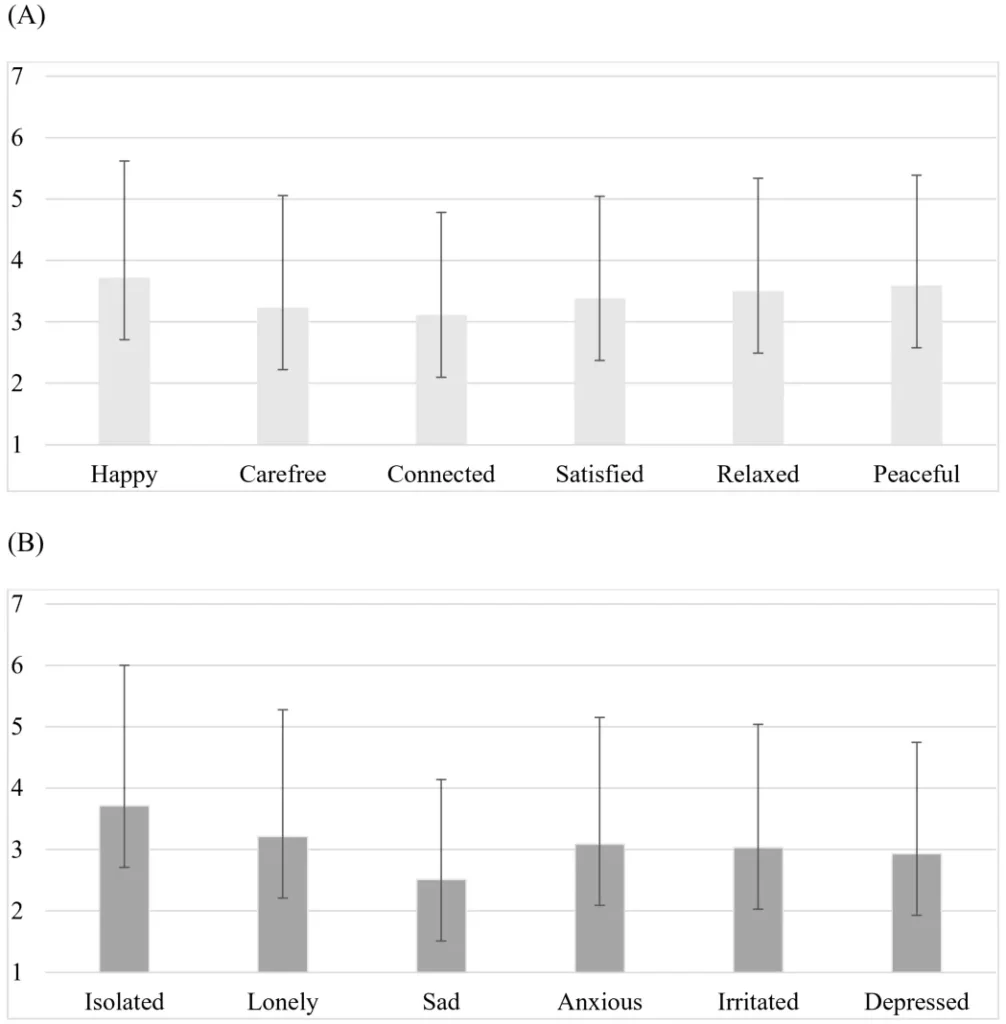
Mediational Analyses 1
To test our hypothesis, we conducted mediational analyses using PROCESS v35 (model 4) (Hayes, 2022). We conducted three different mediation analyses, testing the effects of conspiracy mentality via social isolation and lack of social support on positive emotions while unplugged, negative emotions while unplugged, and life satisfaction while unplugged. In all analyses we controlled for the number of hours the participant was unplugged. The indirect effects were estimated with bootstrapping procedures (5,000 samples, bias corrected). Standardized coefficients are reported.
Positive Emotions While Unplugged.
First, we tested the relationship between conspiracy mentality and positive emotions while unplugged mediated by social isolation and lack of social support, F(2, 90) = 3.13, p = .049. Conspiracy mentality predicted greater social isolation and lack of social support (b = .53, 95% CI [.34, .67], standard error (SE) = .08, p < .001), but social isolation and lack of social support in turn did not predict positive emotions while unplugged (b = .11, 95% CI [-.13, .34], SE = .12, p = .392). The indirect effect between conspiracy mentality and positive emotions while unplugged via social isolation and lack of social support was not significant (b = .06, 95% CI [-.07, .20], SE = .07). After accounting for the indirect effect, the direct effect between conspiracy mentality and positive emotions while unplugged was also not significant (b = -.14, 95% CI [-.36, .08], SE = .11, p = .197; see Figure 2).
Negative Emotions While Unplugged.
We also tested the relationship between conspiracy mentality and negative emotions while unplugged mediated by social isolation and lack of social support, F(2, 90) = 29.01, p < .001. Conspiracy mentality predicted greater social isolation and lack of social support (b = .57, 95% CI [.38, .71], SE = .08, p < .001), and in turn, social isolation and lack of social support predicted higher negative emotions while unplugged (b = .45, 95% CI [.30, .71], SE = .11, p < .001). The indirect effect between conspiracy mentality and negative emotions while unplugged via social isolation and lack of social support was significant (b = .25, 95% CI [.10, .47], SE = .10). After accounting for the indirect effect, the direct effect between conspiracy mentality and negative emotions while unplugged was also significant (b = .29, 95% CI [.12, .52], SE = .10, p = .002; see Figure 3).
Life Satisfaction While Unplugged.
Finally, we tested the relationship between conspiracy mentality and life satisfaction while unplugged mediated by social isolation and lack of social support, (F(2, 91) = 15.42, p < .001). Conspiracy mentality predicted greater social isolation and lack of social support (b = .54, 95% CI [.35, .67], SE = .08, p < .001), and in turn, social isolation and lack of social support predicted lower life satisfaction while unplugged (b = -.29, 95% CI [-.63, -.10], SE = .13, p = .008). The indirect effect between conspiracy mentality and life satisfaction while unplugged via social isolation and lack of social support was significant (b = -.16, 95% CI [-.32, -.03], SE = .10). After accounting for the indirect effect, the direct effect between conspiracy mentality and life satisfaction while unplugged was not significant (b = -.19, 95% CI [-.44, .06], SE = .13, p = .133; see Figure 4).
Figure 2: Mediation model of the effect of conspiracy mentality on positive emotions while unplugged via social isolation and lack of social support, controlling for hours unplugged, Study 1.
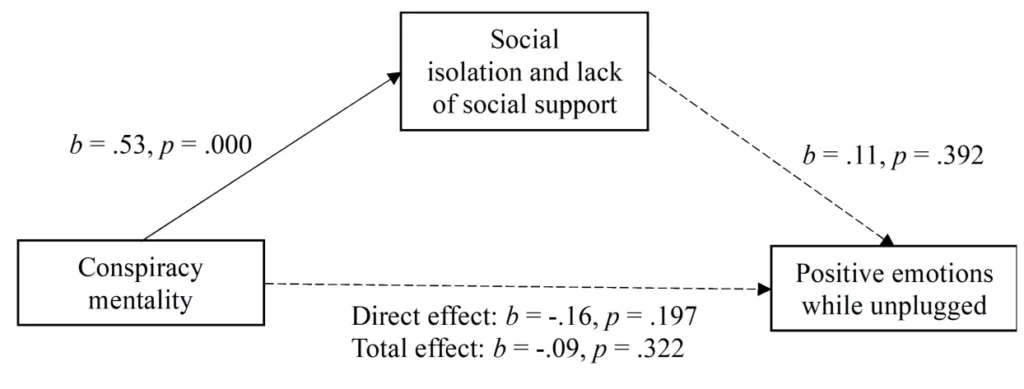
Figure 3: Mediation model of the effect of conspiracy mentality on negative emotions while unplugged via social isolation and lack of social support, controlling for hours unplugged, Study 1.
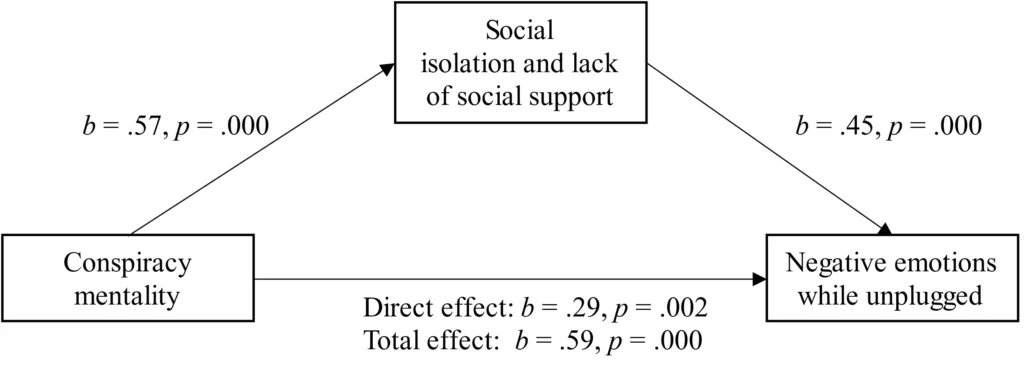
Figure 4: Mediation model of the effect of conspiracy mentality on life satisfaction while unplugged via social isolation and lack of social support, controlling for hours unplugged, Study 1.
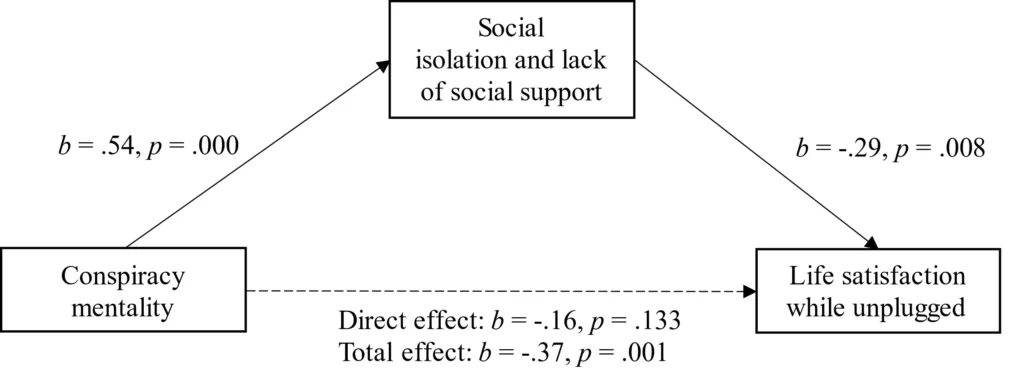
Discussion
Participants reported mixed emotions while being unplugged; the two emotions endorsed most strongly while being unplugged were feeling happy and feeling isolated. Overall, there was a tendency for participants to report slightly more positive emotions than negative emotions while being unplugged (albeit only marginally so). We also found that perceiving lower social support/enhanced social isolation while being unplugged was associated with more negative emotions and reduced life satisfaction (but not with fewer positive emotions). This suggests that abstaining from digital media use does connect the experience of lower social support and isolation perceptions and well-being indicators while being unplugged. We also found that those who belief more strongly in conspiracy theories reported more negative emotions and lower life satisfaction while unplugging. The mediational model provided evidence that this relationship can at least partly be explained by the lower social support and social isolation that those higher in conspiracy beliefs experience while unplugged.
Study 2
Methods
Participants
One hundred and nine first-year undergraduate students at The University of Queensland (Australia) were recruited through the Psychology Research Participation Scheme (SONA), where participants completed the survey in exchange for course credit. Seven participants were excluded because they completed fewer than 50% of the measures, leaving 102 participants for analysis (Mage = 23.12, SDage = 6.80; 66.3% Female, 32.4% Male, 1% Other). Of the full sample, 27.5% reported that they completed the challenge and unplugged for 24 hours.
Procedure
The study was advertised on SONA in 2021. The procedure and materials were the same as for Study 1. After finishing the survey, all participants were provided with a written debrief.
Measures
Participants in Study 2 completed the same measures of conspiracy mentality (α = .93), social isolation and lack of social support (α = .91), positive emotions while unplugging (α = .84), negative emotions while unplugging (α = .87), life satisfaction while unplugging and hours unplugged.
Results
Descriptive Results
Table 2 displays overall means, standard deviations, and bivariate correlations of key variables. In line with what we found in Study 1, conspiracy mentality was significantly associated with higher social isolation and lack of social support and higher negative emotions while unplugged. Furthermore, the association between conspiracy mentality and positive emotions while unplugged was again not significant and (contrary to Study 1), the relationship between conspiracy mentality and life satisfaction while unplugged was also not significant. However, there was again a significant relationship between conspiracy mentality and negative emotions while unplugged. Also, in line with what we found in Study 1, hours unplugged was significantly associated with lower negative emotions while unplugged, higher positive emotions while unplugged and higher life satisfaction while unplugged. However, the relationship between hours unplugged and social isolation and lack of social support was not significant.
Table 2: Descriptive statistics, standard deviations, and bivariate correlations for Study 2
| M | SD | 1 | 2 | 3 | 4 | 5 | |
|---|---|---|---|---|---|---|---|
| 1. Conspiracy Mentality | 4.32 | 1.16 | – | ||||
| 2. Social isolation and lack of social support | 3.48 | 1.45 | .20* | – | |||
| 3. Positive emotions while unplugged | 4.38 | 1.13 | -.06 | -.45*** | – | ||
| 4. Negative emotions while unplugged | 3.12 | 1.39 | .23* | .83*** | -.46*** | – | |
| 5. Life satisfaction while unplugged | 4.85 | 1.22 | -.16 | -.43*** | .57*** | -.53*** | – |
| 6. Hours unplugged | 18.00 | 5.87 | -.04 | -.13 | .33*** | -.25* | .30** |
We also explored the means and standard deviations for all positive and negative emotions that were measured in the study (see Figure 5A and 5B). While unplugged, and different to what we found in Study 1, participants reported higher levels of positive than negative emotions. All positive emotions (except for “connected”) were above the mean point of the scale, while most of the negative emotions (except for “isolated”) were slightly below the mid-point of the scale. Furthermore, the standard deviation for every emotion was high, indicating that there was considerable variability among participants. We also performed a paired sample t-test between the composite score of positive and negative emotions while unplugged. This test showed a significant difference between positive emotions (M = 4.38, SD = 1.13) and negative emotions (M = 3.10, SD = 1.39), t(101) = -5.98, p < .001.
Figure 5: (A) Means and standard deviations of positive emotions. (B) Means and standard deviations of negative emotions.
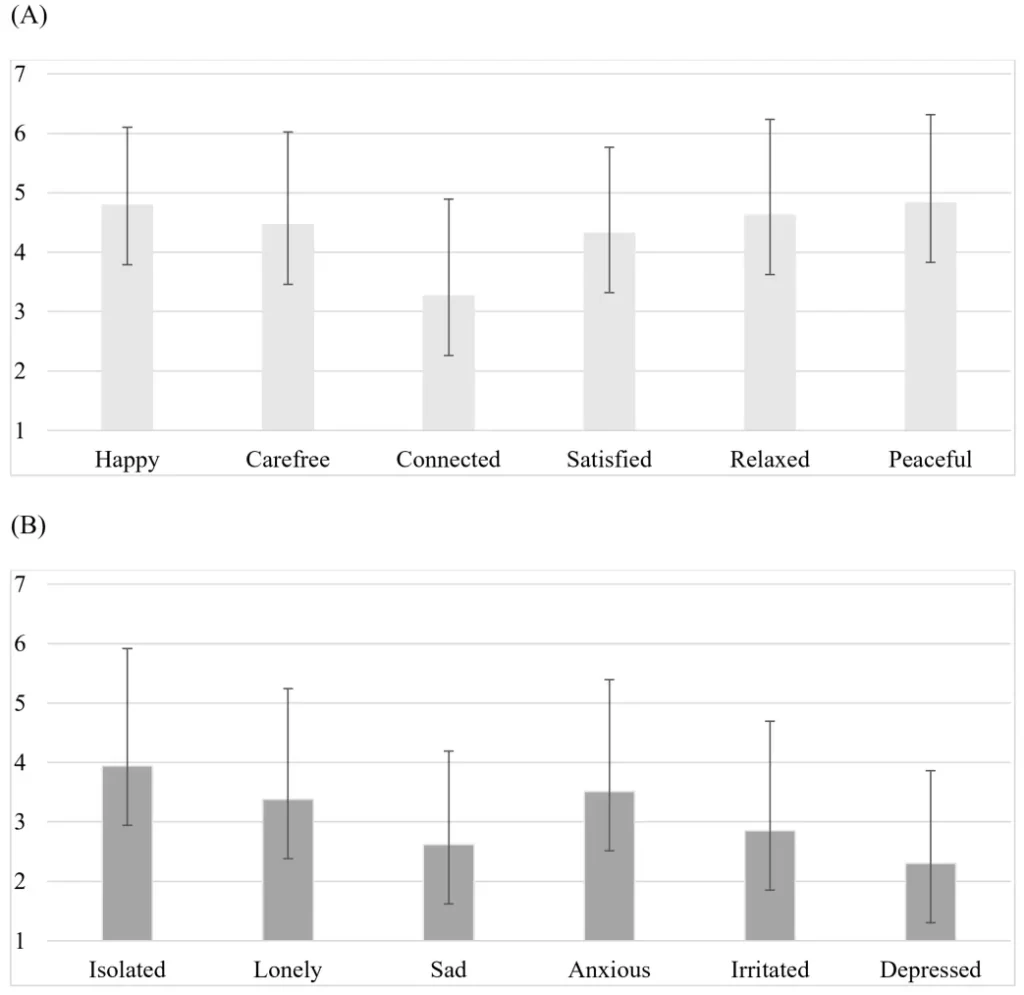
Mediational Analyses
Following the same analytical strategy as in Study 1, we conducted mediational analyses using PROCESS v35 (model 4) (Hayes, 2022) to test our hypothesis.
Positive Emotions While Unplugged.
First, we tested the relationship between conspiracy mentality and positive emotions while unplugged mediated by social isolation and lack of social support, (F(2, 99) = 6.31, p = .003. Conspiracy mentality predicted greater social isolation and lack of social support (b = .19, 95% CI [.00, 48], SE = .12, p = .050), and social isolation and lack of social support in turn predicted lower positive emotions while unplugged (b = -.42, 95% CI [-.46, -.19], SE = .07, p < .001). The indirect effect between conspiracy mentality and positive emotions while unplugged via social isolation and lack of social support was significant (b = -.08, 95% CI [-.18, -.01], SE = .04). After accounting for the indirect effect, the direct effect between conspiracy mentality and positive emotions while unplugged remained not significant (b = .00, 95% CI [-.17, .18], SE = .09, p = .989; see Figure 6).
Negative Emotions While Unplugged.
We also tested the relationship between conspiracy mentality and negative emotions while unplugged mediated by social isolation and lack of social support, F(2, 99) = 6.28, p = .003. Conspiracy mentality predicted greater social isolation and lack of social support (b = .19, 95% CI [.00, .48], SE = .12, p = .050), and in turn, social isolation and lack of social support predicted higher negative emotions while unplugged (b = .79, 95% CI [.65, .87], SE = .05, p < .001). The indirect effect between conspiracy mentality and negative emotions while unplugged via social isolation and lack of social support was significant (b = .15, 95% CI [.01, .29], SE = .07). After accounting for the indirect effect, the direct effect between conspiracy mentality and negative emotions while unplugged was not significant (b = .08, 95% CI [-.05, .21], SE = .07, p = .225; see Figure 7).
Life Satisfaction While Unplugged.
Finally, we tested the relationship between conspiracy mentality and life satisfaction while unplugged mediated by social isolation and lack of social support, F(2, 99) = 6.43, p = .002. Conspiracy mentality predicted greater social isolation and lack of social support (b = .19, 95% CI [.00, .48], SE = .12, p = .050), and in turn, social isolation and lack of social support predicted lower life satisfaction while unplugged (b = -.38, 95% CI [-.47, -.17], SE = .08, p < .001). The indirect effect between conspiracy mentality and life satisfaction while unplugged via social isolation and lack of social support was significant (b = -.07, 95% CI [-.16, -.01], SE = .04). After accounting for the indirect effect, the direct effect between conspiracy mentality and life satisfaction while unplugged remained non-significant (b = -.08, 95% CI [-.27, .10], SE = .09, p = .386; see Figure 8).
Figure 6: Mediation model of the effect of conspiracy mentality on life satisfaction while unplugged via social isolation and lack of social support, controlling for hours unplugged, Study 2.
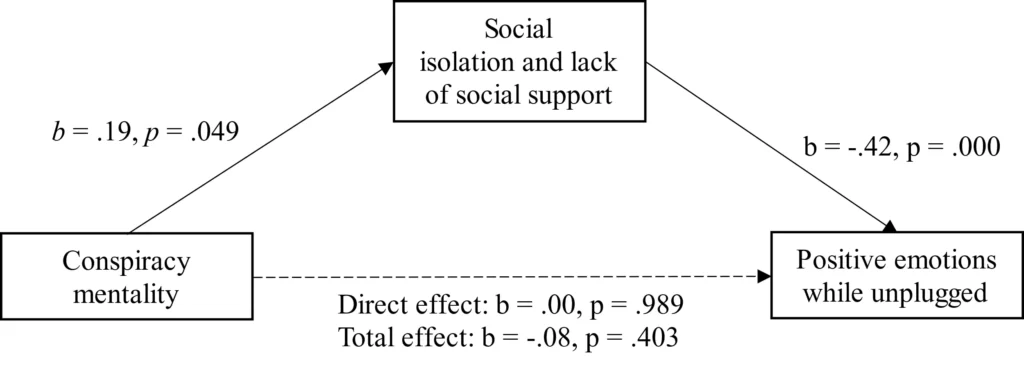
Figure 7: Mediation model of the effect of conspiracy mentality on negative emotions while unplugged via social isolation and lack of social support, controlling for hours unplugged, Study 2.
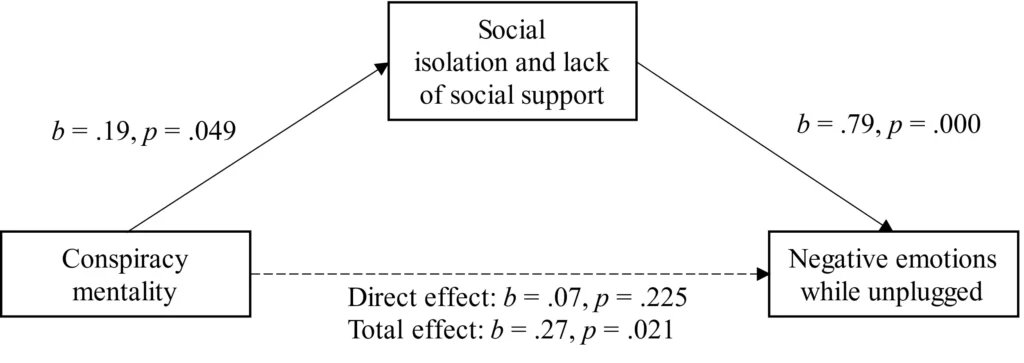
Figure 8: Mediation model of the effect of conspiracy mentality on life satisfaction while unplugged via social isolation and lack of social support, controlling for hours unplugged in Study 2.
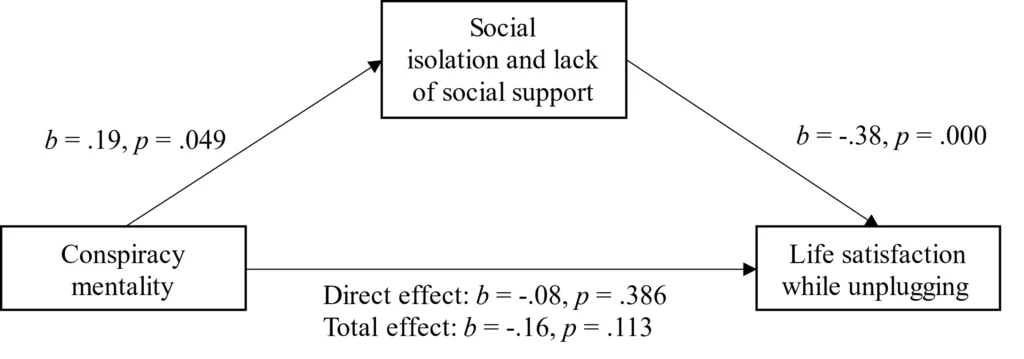
Discussion
As in Study 1, but this time to an even greater degree, participants reported higher levels of positive than negative emotions. All positive emotions were rated equally highly except for “feeling connected” which was rated relatively lower. As in Study 1, feeling isolated was the highest rated negative emotion. As in the first study, there was considerable variability in the emotions that participants experienced as indicated by the relatively high standard deviations. We also again found that perceiving lower social support/enhanced social isolation while being unplugged was associated with more negative emotions (but not with reduced life satisfaction or fewer positive emotions). We only replicated the findings of Study 1 for the relationship between conspiracy mentality and negative emotions whereby those who believe more strongly in conspiracy theories reported more negative emotions while unplugged. Mediational analyses again showed evidence that this relationship can at least partly be explained by the lower level of perceived social support and higher level of social isolation that those higher in conspiracy beliefs experience while being unplugged.
General Discussion
In sum, the results of the two studies showed that unplugging was either marginally significantly (Study 1, Chinese sample) or significantly (Study 2, Australian sample) associated with more positive emotions than negative emotions. In Study 1, feelings of happiness during unplugging were prevalent and in Study 2, in addition to happiness, participants also reported feeling relatively carefree, satisfied, relaxed, and peaceful (i.e., with means above the midpoint of the scale). However, participants in both studies also reported negative emotions while being unplugged. In particular, in both studies participants reported that unplugging made them feel somewhat isolated and lonely, although ratings were below the midpoint of the scale. These findings are consistent with previous findings that have shown how unplugging can produce a mix of negative and positive emotions (Thomas et al., 2016).
In this study, we also explored the relationship between social isolation and lack of social support and three indicators of well-being during the unplugging experience: positive emotions, negative emotions, and life-satisfaction. We found in both studies that there was no relationship between social isolation and lack of social support with positive emotions, but social isolation and lack of social support was associated with life-satisfaction in Study 1 (but not in Study 2) and with negative emotions in both studies. These mixed results indicate that there is no straightforward connection between social isolation and lack of social support during the unplugging experience and well-being indicators. That is, even though it has been questioned whether online social networks provide social support, we did not find much evidence that disconnecting from the online social network increased social isolation and decreased perceived social support (Arampatzi et al., 2018; Helliwell & Huang, 2013).
Perhaps most interesting were findings in relation to the question of whether conspiracy mentality affected the unplugging experience. In both studies we found that those reporting higher levels of conspiracy beliefs reported more negative emotions during unplugging. In Study 1 (but not in Study 2), those with higher levels of conspiracy beliefs also reported lower life satisfaction while being unplugged. In both studies these relationships were mediated by feeling socially isolated and less supported while being unplugged. That is, those higher in conspiracy beliefs experienced more negative emotions during unplugging at least partly because the unplugging experience made them feel more socially isolated and less socially supported. This suggests that those who believe more strongly in conspiracy beliefs suffer a loss of social support when they abstain from being online. It may be the case that individuals with higher conspiracy beliefs rely more heavily on online conspiracy groups for social support, and that this increases their vulnerability to become more socially isolated during disconnection (Freeman & Bentall, 2017; Grzesiak-Feldman, 2013).
Implications
We found that those who believe in conspiracy theories can find social support online and because they feel less socially isolated by connecting online that these individuals are negatively affected when going online is no longer an option. The sense of social support that the online community provides may be essential in protecting well-being, but it may also be the case that social support affirms conspiracy beliefs thereby strengthening the conspiracy mentality. This finding connects well with research by Nera et al. (2022) showing that group formation among those who believe in conspiracy theories may occur following the perception that they are not accepted by the mainstream. Online communities then become a haven where individuals may find connection that they do not find in their offline communities. As a result of this, their belief system may be further reinforced.
The present research also has implications for how we can explore the impact of being online at all times. Methodologically, by exploring how we are affected when we are no longer able to live out our online lives, we can get a better grasp on how the internet shapes and determines our lives and affects us. This is important because by examining the question empirically we can provide a more nuanced view of the positive but also the negative impacts of being hyperconnected, allowing us to go beyond ideological objections or endorsements of our digital lives.
The findings of this study are also relevant for debate about online addiction, and for the question whether some individuals are more prone to become addicted to social media. The literature in question often attributes on-line addiction to personality traits (Bessi, 2016), and typically such studies view ‘conspiracy beliefs’ as the yet another symptom of online addiction (Marchlewska et al., 2018) rather than as a potential reason why people might end up developing an online addiction. The findings of the present research may lead us to consider the possibility that conspiracy beliefs can predispose online users to seek out echo chambers that trigger online addiction.
Limitations and Future Research
Despite providing support for a number of our predictions, the present research is not without limitations. The most important limitation was that we did not include a control condition where participants could go online as per normal. As a result, given the lack of a baseline, we are not in a position to answer the question whether unplugging per se is associated with more positive or more negative emotions. It may well be the case that those that score higher in terms of conspiracy beliefs chronically experience more social isolation and less support as well as more negative emotions. Even though this alternative explanation might not fully explain the results because questions were asked about the experience while being unplugged, we recommend that future research uses an experimental design (with random allocation to unplugging or control condition) to explore these relationships further.
Related to this, our findings are correlational. Even though the proposed model appears to be theoretically the most plausible in terms of its directionality (i.e., with individual difference in conspiracy mentality affecting the way the unplugging experience was perceived), future research should provide evidence for causality by manipulating conspiracy mentality. Furthermore, future research should also aim to ensure that all participants in the unplugging challenge are unplugged for the full 24 hours. Even though we encouraged honest reporting of a failure to unplug for the full time period, we were not able to know for sure that participants were honest in their answers to the question of how long they had been unplugged. Another limitation relates to the fact that, even though we controlled for the hours that participants had been unplugged, the experiences of those who were unplugged for longer may have been qualitatively different from the experiences of those who were unable to complete the full unplugging period and drop out may not have been random. Related to this, there may be a self-selection bias in the kind of participants who took part in the unplugging challenge, and it is likely we oversampled people who felt confident they were able to complete the task. This particular limitation is difficult to overcome given ethical guidelines that require that participation is voluntary. Nevertheless, future research might want to explore support for hypotheses in contexts where self-selection is less of a concern (e.g., at remote retreats for a particular cohort). Furthermore, conspiracy mentality was rather low in both the Chinese and Australian samples, and it would hence be worthwhile to test support for these hypotheses in samples where conspiracy beliefs are more prevalent. Finally, given the mediating role of social support in explaining emotions associated with the unplugging experience, future research might want to explore among those varying in their belief in conspiracy beliefs which kind of unplugging experience is associated with highest feelings of social isolation. For instance, future research could experimentally vary the kinds of online access participants refrain from (e.g., communication with others versus from online news or entertainment).
Conclusion
We investigated how people feel while they are unplugged from social media for 24 hours. We found that feeling more isolated and less supported while unplugging was associated with experiencing more negative emotions while being unplugged. We also found that this was especially true for those higher in conspiracy mentality. That is, the studies showed that individuals with higher conspiracy beliefs have higher negative emotions during unplugging, because they feel more socially isolated and less supported during the unplugging experience. This suggests that social media plays an important role for those higher in conspiracy beliefs because it provides them with a community where they find support for these beliefs. This becomes apparent when opportunities for online connection are cut off and negative emotions are more strongly experienced by those who feel that the unplugging experience leaves them isolated and unsupported.
Author Contributions
JJ and CZ designed the study and CZ collected the data as part of their honours thesis. BA analysed the data and wrote up the methods and results for both studies. JJ drafted the manuscript. All authors commented on drafts and provided critical revisions.
Funding
This contribution was supported by an Australian Research Council Laureate Fellowship awarded to the first author (FL180100094).
Declarations of Interest
The authors have no competing interests to declare.
Data Availability Statement
The data are available at https://osf.io/gc3ku/.
Notes
- One could argue that some emotions (in particular “isolated”, “lonely”, “connected”) are confounded with the mediator social isolation and lack of support. We therefore decided to conduct the mediational analyses again this time removing the items that, at face value, appear to have some conceptual overlap with our proposed mediator. The results are largely identical when these items are removed. These mediational analyses are reported in the Supplementary Online Materials (Alvarez & Jetten, 2023).
References
-
Social isolation, social support and their relationship with smartphone addiction. Information, Communication & Society, 24 (13), 1925–1943. https://doi.org/10.1080/1369118X.2020.1749698
-
The interplay between Facebook use, social comparison, envy, and depression. Current Opinion in Psychology, 9 , 44–49. https://doi.org/10.1016/j.copsyc.2015.10.006
-
Social network sites, individual social capital and happiness. Journal of Happiness Studies, 19 (1), 99–122. https://doi.org/10.1007/s10902-016-9808-z
-
Creativity in the wild: improving creative reasoning through immersion in natural settings. PLoS ONE, 7 (12). https://doi.org/10.1371/journal.pone.0051474 .
-
Supplementary Online Material. Open Science Foundation . https://doi.org/10.17605/OSF.IO/GC3KU
-
Personality traits and echo chambers on Facebook. Computers in Human Behavior, 65 , 319–324. http://doi.org/10.1016/j.chb.2016.08.016
-
Do your own research: Conspiracy theories and the internet. Social Research: An International Quarterly, 89 (3), 579–605. http://doi.org/10.1353/sor.2022.0049
-
The strength of internet ties. https://www.pewresearch.org/internet/2006/01/25/the-strength-of-internet-ties/
-
Social media use intensity, social media use problems, and mental health among adolescents: Investigating directionality and mediating processes. Computers in Human Behavior, 116 . https://doi.org/10.1016/j.chb.2020.106645 .
-
Emotion, social relationships, and health. Oxford University Press https://doi.org/10.1093/acprof:oso/9780195145410.001.0001
-
The influence of social media use on attitude toward suicide through psychological well-being, social isolation, and social support. Information, Communication & Society, 23 (10), 1427–1443. https://doi.org/10.1080/1369118X.2019.1574860
-
Does self-love or self-hate predict conspiracy beliefs? Narcissism, self-esteem, and the endorsement of conspiracy theories. Social Psychological & Personality Science, 7 (2), 157–166. https://doi.org/10.1177/1948550615616170
-
Social network usage & growth statistics: How many people use social media in 2022? https://backlinko.com/social-media-users
-
The spreading of misinformation online. Proceedings of the National Academy of Sciences, 113 (3), 554–559. https://doi.org/10.1073/pnas.1517441113
-
The psychology of conspiracy theories. Current Directions in Psychological Science, 26 (6), 538–542. https://doi.org/10.1177/0963721417718261
-
Negative social comparison on Facebook and depressive symptoms: Rumination as a mechanism. Psychology of Popular Media, 2 (3), 161–170. https://doi.org/10.1037/a0033111
-
The concomitants of conspiracy concerns. Social Psychiatry and Psychiatric Epidemiology, 52 (5), 595–604. https://doi.org/10.1007/s00127-017-1354-4
-
The effect of high-anxiety situations on conspiracy thinking. Current Psychology, 32 (1), 100–118. https://doi.org/10.1007/s12144-013-9165-6
-
Development of the 12-Item Social Media Disinformation Scale and its association with social media addiction and mental health related to COVID-19 in Tunisia: Survey-Based pilot case study. JMIR Formative Research, 5 (6). https://doi.org/10.2196/27280 .
-
The new psychology of health: Unlocking the social cure. Routledge https://doi.org/10.4324/9781315648569
-
Introduction to mediation, moderation, and conditional process analysis: A regression-based approach. (3 ed.). Guilford Publications
-
Comparing the happiness effects of real and online friends. PLoS One, 8 (9). https://doi.org/10.1371/journal.pone.0072754 .
-
“Facebook Depression?” Social networking site use and depression in older adolescents. Journal of Adolescent Health, 52 (1), 128–130. https://doi.org/10.1016/j.jadohealth.2012.05.008
-
Economic inequality and conspiracy theories. Current Opinion in Psychology, 47 . https://doi.org/10.1016/j.copsyc.2022.101358 .
-
The Facebook paths to happiness: Effects of the number of Facebook friends and self-presentation on subjective well-being. Cyberpsychology, Behaviour, and Social Networking, 14 (6), 359–364. http://doi.org/10.1089/cyber.2010.0374
-
Stigmatised beliefs: Conspiracy theories, anticipated negative evaluation of the self, and fear of social exclusion. European Journal of Social Psychology, 48 (7), 939–954. https://doi.org/10.1002/ejsp.2498
-
COVID-19 conspiracy beliefs: Relations with anxiety, quality of life, and schemas. Personality and Individual Differences, 175 . https://doi.org/10.1016/j.paid.2021.110704 .
-
Addicted to answers: Need for cognitive closure and the endorsement of conspiracy beliefs. European Journal of Social Psychology, 48 (2), 109–117. https://doi.org/10.1002/ejsp.2308
-
The effect of social networking sites on the relationship between perceived social support and depression. Psychiatry Research, 246 , 223–229. https://doi.org/10.1016/j.psychres.2016.09.018
-
The effects of Facebook relational maintenance on friendship quality: An investigation of the Facebook relational maintenance measure. Communication Research Reports, 35 (1), 1–11. https://doi.org/10.1080/08824096.2017.1361393
-
Problematic social media use and social support received in real-life versus on social media: Associations with depression, anxiety and social isolation. Addictive Behavior, 119 , Article 106949. https://doi.org/10.1016/j.addbeh.2021.106949
-
‘Who wants to silence us?’: Perceived discrimination of conspiracy theory believers increases ‘conspiracy theorist’ identification when it comes from powerholders – But not from the general public. British Journal of Social Psychology, 61 (4), 1263–1285. https://doi.org/10.1111/bjso.12536
-
When do people verify and share health rumors on social media? The effects of message importance, health anxiety, and health literacy. Journal of Health Communication, 24 (11), 837. https://doi.org/10.1080/10810730.2019.1677824
-
Social disconnection during COVID-19: The role of attachment, fear of missing out, and smartphone use. Journal of Research on Adolescence, 31 (3), 748–763. https://doi.org/10.1111/jora.12658
-
About three-in-ten U.S. adults say they are ‘almost constantly’ online. Pew Research Center. https://www.pewresearch.org/fact-tank/2021/03/26/about-three-in-ten-u-s-adults-say-they-are-almost-constantly-online/
-
Social media and loneliness: Why an Instagram picture may be worth more than a thousand Twitter words. Computers in Human Behavior, 62 , 155–167. https://doi.org/10.1016/j.chb.2016.03.084
-
The effects of ambient media: what unplugging reveals about being plugged in. First Monday, 19 (8). https://doi.org/10.5210/fm.v19i8.5220
-
Social support, loneliness, recuperative processes, and their direct and indirect effects on health. Health Communication, 26 (3), 221–232. https://doi.org/10.1080/10410236.2010.546771
-
Social media use and perceived emotional support among US young adults. Journal of Community Health, 41 (3), 541–549. https://doi.org/10.1007/s10900-015-0128-8
-
Seeing everyone else’s highlight reels: How Facebook usage is linked to depressive symptoms. Journal of Social and Clinical Psychology, 33 (8), 701–731. https://doi.org/10.1521/jscp.2014.33.8.701
-
The Conspiracy Mentality Scale: Distinguishing between irrational and rational suspicion. Social Psychology, 50 (4), 215–232. https://doi.org/10.1027/1864-9335/a000381
-
Stress-buffering role of social support during COVID-19. Family Process, 60 (3), 1002–1015. https://doi.org/10.1111/famp.12618
-
Unplugged: Exploring the costs and benefits of constant connection. Computers in Human Behavior, 63 , 540–548. https://doi.org/10.1016/j.chb.2016.05.078
-
Increases in depressive symptoms, suicide-related outcomes, and suicide rates among US adolescents after 2010 and links to increased new media screen time. Clinical Psychological Science, 6 (1), 3–17. https://doi.org/10.1177/2167702617723376
-
Social networking sites addiction and adolescent depression: A moderated mediation model of rumination and self-esteem. Personality and Individual Differences, 127 , 162–167. https://doi.org/10.1016/j.paid.2018.02.008
-
Mobile social media use and self-identity among Chinese adolescents: The mediating effect of friendship quality and the moderating role of gender. Current Psychology, 40 , 4479–4487. https://doi.org/10.1007/s12144-019-00397-5
-
Upward social comparison on mobile social media and depression: The mediating role of envy and the moderating role of marital quality. Journal of Affective Disorders, 270 , 143–149. https://doi.org/10.1016/j.jad.2020.03.173







